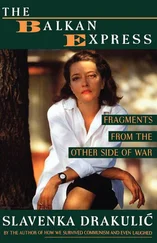Slavenka Drakulic
Frida's Bed
Slavenka Drakulić was born in Croatia in 1949. Her nonfiction books include How We Survived Communism and Even Laughed , a feminist critique of communism that brought her to the attention of the public in the West; The Balkan Express: Fragments from the Other Side of the War , a personal eyewitness account of the war in her homeland; Café Europa: Life After Communism (Penguin); and They Would Never Hurt a Fly (Penguin). Drakulić is also the author of the novels Holograms of Fear , which was a bestseller in Yugoslavia and was short-listed for The Best Foreign Book Award by The Independent (UK), Marble Skin, The Taste of a Man (Penguin), and S . (Penguin). A freelance journalist who contributes to The New York Times, The Nation, The New Republic, Frankfurter Allgemeine Zeitung (Germany), Dagens Nyheter (Sweden), and La Stampa (Italy), as well as other magazines and newspapers, she now divides her time among Sweden, Austria, and Croatia.
Physical pain does not simply resist language but actively destroys it, bringing about an immediate reversion to a state anterior to language, to sounds and cries a human being makes before language is learned.
— ELAINE SCARRY, The Body in Pain
Mi pintura lleva el mensaje del dolor.
— FRIDA KAHLO
THAT EARLY JULY MORNING FRIDA WOKE up in her bed at her parents’ house. A faint light was already creeping into the room. She had spent a restless night. With an effort, she turned over, propped herself up on the pillows and touched her face as if to make sure that it was still there. She lay there quite still for a while, looking at her arms on the bedcover, then ran her fingers through her hair — her face, her hair, her hands, they were all parts of what had once been a whole. She tried to get out of bed, but then gave up. She had no strength left. Her mind was troubled.
Last year when my leg was amputated it was my — what? — thirty-second operation? Frida tried to remember exactly, touching the scars on her back, her tummy, her leg. I can’t remember them all. I wonder if abortions count as operations. Even if I forget those that leave no visible scars I still can’t count them all. This counting is useless, she thought.
She looked at the empty spot under the sheet where her sick leg used to be. Strange how she could still feel the half that had been sawed off. That was the same leg, half of the same right leg where the demonic pain had first appeared.
She had been six years old. One morning she woke up with a fever. At first her parents were not worried. Fevers, temperatures, colds, sore throats, diarrhea, vomiting, tummy aches — like all children, their four little girls would occasionally fall ill. They had no reason to suspect that this time it was different.
And then came the pain. First in her leg, as if something had sunk its teeth into it. A huge beast, a dog, maybe. It locked its jaws onto her limb and tore at the muscles with its teeth. She screamed, that was all she could do, scream. She could not describe the feeling of having part of her body ripped apart. She remembered her father’s despair, his face as he leaned over her bed, and his words: What is it, tell me, what is it? As she writhed in pain, soaked in her own sweat, Don Guillermo, her kind, good father, waited for her to tell him. For an explanation. A meaningful verbalization of this horror, so that he could understand what was happening to his child. Otherwise, how could he help her? Because her frenzied cries were not enough. Pain needs to be articulated, communicated. It needs a kind of dialogue. It needs words. But only screams and shrieks of pain escaped from the child’s lips.
She could still see her leg (her poor little leg, she would say if it didn’t sound so pathetic), jerking and twitching on the bed. As if possessed and divorced from the rest of her body. She could see her mother soaking a towel in hot water, the maid’s dark hands holding the white porcelain basin, her fingers curled around the rim. She focused on the sparkles in the glistening water, on something that could take her mind off her leg, off herself. To leave her body, that was what she wanted. Or for someone to cut her leg off, because it was not hers anymore. But it kept leaping off the bed as if it had gone mad. She screamed in panic. Her mother wrapped a hot towel around her poor little leg (yes, there it was after all!) and kept saying, she could hear her even now: Ssh, ssh, it’ll go away, it’ll go away.
I remember my mother’s words because over the years she was to say them again and again. And with reason, except neither of us could know that at the time, a time when this still-unknown, unnamed fiendish beast was tearing away at my flesh, and my mother, wiping the sweat from my forehead, was whispering, It’ll go away .
And indeed, the pain would ease for a bit, the beast would tire. The child would succumb to the bliss of no pain, only to scream even louder a minute later. The beast had sunk its teeth into her leg and would not let go. As if it had decided to rip it off and devour it.
Her parents finally called in the doctor. The diagnosis: poliomyelitis. The therapy: rest and bed. The consequence: one leg thinner and shorter than the other.
She was bedridden for nine months; an eternity for such a lively child. Since she could not leave her room, she created an imaginary little friend who helped transport her to another world.
Her little friend did not have a name. Frida would blow on the windowpane by her bed and then quickly, quickly trace a door on the foggy glass with her finger. Only the door was very, very small and invisible. The little girl was invisible too, invisible to everybody but her.
Once she had squeezed through the door into this other world, she would find her little friend there waiting for her. Always cheerful and laughing, she would take Frida by the hand and lead her away. Only the two of them inhabited this other world. She could no longer remember her little friend’s voice or face; she just knew that they danced in a big empty ballroom, which looked as if it were made of ice. The little girl danced and she followed and talked to her. She talked and talked, and danced. She glided across the floor, twirling and moving with ease. Her crippled leg did not bother her; she did not even feel it. The two of them were a perfect pair. And when she returned to her bed, she felt inexplicably happy for a long time afterward.
In Girl with Death Mask, a small picture, one of the smallest she ever painted, all you can see on the horizon are the icy snowcapped mountain peaks. A lone girl with a grinning death mask is standing on the hard, dark ground. It is not quite clear whether it is simply a mask or perhaps her own skull. Next to her foot lies another, even more terrifying mask of an animal, its teeth bared, its tongue sticking out, its mouth still red with blood from her leg. The little girl could have worn this mask, but she didn’t. It doesn’t really matter, though, because the two masks simply represent different forms of death.
Death has hovered around her since childhood. A shadow that is always there. A ghostly white skull with touches of gray; gray, the color of fear, is ever-present in her life and a part of her.
She is standing there alone beneath the angry sky and swirl of menacing clouds. Still a child, she has yet to grow into her face. When she grows up she will have Frida’s face.
Again and again Frida will paint her own face over the white skull, proof that she is still alive.
Читать дальше












